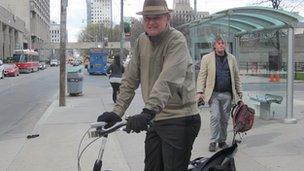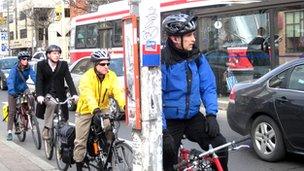Cyclists accuse Toronto mayor Ford of 'war on bikes'
- Published
VIDEO: Cyclists in Toronto are accusing the city mayor of waging a 'war on bikes'.
Toronto's tough-talking mayor has never hidden his disdain for cyclists. Now they are accusing him of trumping up a war on two-wheeled commuters. Bike lanes have been removed but are the city's streets any more dangerous to ride?
Rob Ford cruised to victory as city mayor a year-and-a-half ago pledging to end what he dubbed "the war on the car". He argued that bike lanes were taking away space for cars.
"And what I compare bike lanes to is swimming with the sharks. Sooner or later you're going to get bitten," said Ford speaking in 2010 as a Toronto city council-member.
"And every year we have dozens of people that get hit by cars or trucks. Well, no wonder: roads are built for buses, cars, and trucks, not for people on bikes.
"My heart bleeds for them when I hear someone gets killed, but it's their own fault at the end of the day."

Toronto mayor Rob Ford, right, prides himself on his straight-talking approach - much like Donald Trump.
Since Ford came into office, Toronto hasn't just stopped putting in bike lanes; it has started removing some of them.
Last year, the Toronto city council voted to remove three bike lanes. The city council did, however, also <link> <caption>agree to upgrade</caption> <url href="http://www.cbc.ca/news/canada/toronto/story/2011/07/13/jarvis-bike-lane.html" platform="highweb"/> </link> a couple of existing bike lanes to physically separated traffic lanes, which are safer for cyclists. A few more lanes could be added after a further study is conducted.
Ford's office didn't respond to repeated interview requests. But cyclists on the streets of Toronto were happy to share their thoughts on the mayor.
"To have the war against bikes, or in his case, what he believed is the war against cars, is insane and ludicrous as far as I'm concerned," said cyclist Sean Siford.
Christine Montgomery added: "He's completely awful."
John Barber is also no fan of the mayor and his car-friendly policies.
He writes a <link> <caption>column</caption> <url href="http://www.theglobeandmail.com/news/national/toronto/globe-to/in-the-aftermath-of-tragedy-once-more-unto-the-breach/article2234244/" platform="highweb"/> </link> for the Globe and Mail newspaper about life in Toronto. He's also been cycling in the city for 50 years.
"There's this weird culture war," said Barber.
"You know in one of the newspapers, they're calling bicyclists 'helmet heads.' You're in part of some kind of tribe, and they impute all kinds of motives to you.
"And it's this war between people who... somebody is trying to trump a war between bicyclists and cars. It never existed in the past."

Columnist and cyclist John Barber claims Mayor Ford is "trumping up a war" between bikes and cars
Fifteen years ago, Bicycling Magazine named Toronto North America's best city for cycling. Now, Toronto is the bike <link> <caption>collision capital of Canada</caption> <url href="http://www.toronto.ca/transportation/publications/brochures/2011_bike.pdf" platform="highweb"/> </link> , with more accidents per capita than any other major Canadian city.
Yet many Toronto motorists are up in arms when there's talk of narrowing roads to add bike lanes, said Barber.
"Nobody says, 'Well, hey we're killing people at twice the rate of Vancouver. Shouldn't we try to think of making these streets a little bit safer?'"
Many motorists feel that cyclists are the ones making the streets unsafe, and there's been plenty of <link> <caption>online discussion</caption> <url href="http://news.nationalpost.com/2011/06/12/posted-toronto-political-panel-a-war-on-bikes/" platform="highweb"/> </link> on this topic.
Some say reckless bikers pose a threat to pedestrians and other cyclists. Others complain about an "idiot on a bike" who veered in and out of traffic, ignoring the rules of the road.
Barber would like to see police enforce those rules for cyclists.
But he says in the end, bikes need their own space, and the city needs more bike lanes. He calls the mayor's stance "completely crazy."
"People want bicycles lanes everywhere in North America," said Barber. "There's a demand among the constituents for bicycle infrastructure. And nothing could be cheaper; it's a matter of painting lines, right?"
Painting some lines on the road may be cheap. But there's another cost.
"If you put in a bike lane, you have to take something out: it's either a traffic lane, or parking," explained Nancy Smith Lea, director of the Toronto Center for Active Transportation. "And for the most part, when the parking is removed, that's the most contentious issue."
One big problem bikers face, almost everywhere, is what cyclists in Toronto call "the door prize" - when somebody getting out of their car hits you with their door.

Cyclists are frustrated by the removal of bike lanes
Smith Lea advocates getting rid of some on-street parking to create a few bike corridors. She says many people don't react so well to this.
"People go bananas. But I think it's what needs to happen."
Here's the counter argument: adding bike lanes will help some cyclists, but will have a negative effect on many more drivers.
Cycling safety became front page news in Toronto last fall when a young mother, who was also five months pregnant, was <link> <caption>killed on her bike</caption> <url href="http://www.thestar.com/news/article/1083365--dead-cyclist-jenna-morrison-was-a-yoga-teacher-dancer-mom" platform="highweb"/> </link> . She was crushed under the wheels of a truck. In a separate incident, an enraged driver chased a cyclist onto a sidewalk in his car.
Add it all up, and it may sound like Toronto's streets have turned into some kind of a roller derby.
Not so, says Ron Buliung, a professor of transportation geography at the University of Toronto and a bike commuter. He went back and looked at police reports over the past decade.
"And we're not seeing dramatic increases in fatalities or injuries of any kind, or much change in the frequency of injury on our major arterials," said Buliung.
He says what's happening is that other North American cities are becoming much safer for cyclists, much faster.
Meanwhile, progress in Toronto has stalled. Toronto has been averaging more than 1,100 reported <link> <caption>cycling collisions </caption> <url href="http://www.toronto.ca/transportation/publications/brochures/2011_bike.pdf" platform="highweb"/> </link> over the past five years.
Add one more to this year's tally.
"I've not had a collision with a motor vehicle, except for today actually, the day I'm coming to speak to you about cycling in Toronto," said Buliung.
Builing was sideswiped by a car. He was not injured.
<italic>Listen to Jason Margolis' full report a</italic> <italic>t</italic> <link> <caption>PRI's The World</caption> <url href="http://www.theworld.org/2012/05/war-on-the-streets-of-toronto-motorists-vs-cyclists/" platform="highweb"/> </link> , <italic> a co-production of the BBC World Service, Public Radio International, and WGBH in Boston.</italic>